Stimulasi Pemahaman Konsep Matematika Anak Usia Dini Melalui Aktivitas Montessori
Abstract
Understanding mathematical concepts is a crucial aspect of early childhood cognitive development. However, mathematics learning in early childhood education institutions is often delivered abstractly and symbolically, which does not align with children's developmental stages. This study aims to theoretically examine how Montessori activities can stimulate the understanding of mathematical concepts in early childhood. The study uses a descriptive qualitative approach with a literature review method. Data were collected from journal articles, academic books, and other relevant scholarly publications from the last ten years. The results show that Montessori activities, which are concrete, multisensory, and exploratory—such as number rods, sandpaper numbers, and golden beads—are effective in helping children understand basic mathematical concepts such as numbers, quantities, shapes, and patterns. These activities also contribute to the development of cognitive functions and independent learning. In conclusion, the Montessori approach is a relevant and effective strategy for stimulating early childhood mathematical understanding and is suitable for implementation in early childhood education practices.
Kemampuan memahami konsep matematika merupakan bagian penting dalam perkembangan kognitif anak usia dini. Namun, pembelajaran matematika di lembaga pendidikan anak usia dini masih sering disampaikan secara abstrak dan simbolik, kurang sesuai dengan tahap perkembangan anak. Penelitian ini bertujuan untuk mengkaji secara teoritis bagaimana aktivitas Montessori dapat menstimulasi pemahaman konsep matematika pada anak usia dini. Penelitian menggunakan metode kajian pustaka dengan pendekatan kualitatif deskriptif. Data diperoleh dari artikel jurnal, buku akademik, dan publikasi ilmiah lainnya yang relevan dan terbit dalam sepuluh tahun terakhir. Hasil kajian menunjukkan bahwa aktivitas Montessori yang bersifat konkret, multisensorik, dan eksploratif seperti number rods, sandpaper numbers, dan golden beads efektif dalam membantu anak mengenal konsep dasar matematika seperti angka, jumlah, bentuk, dan pola. Aktivitas tersebut juga berkontribusi pada perkembangan fungsi kognitif dan kemandirian belajar anak. Kesimpulannya, pendekatan Montessori dapat menjadi strategi yang relevan dan efektif dalam menstimulasi pemahaman konsep matematika pada anak usia dini serta layak untuk diterapkan dalam praktik pendidikan PAUD.
Keywords
Full Text:
PDFReferences
Baroody, A. J., et al. (2017). Early childhood mathematics. Routledge. Berk, L. E. (2018). Development Through the Lifespan. Pearson.
Cheng, Y., & Mix, K. S. (2014). Spatial training improves children's math word problem solving. Journal of Cognition and Development, 15(1), 2–23.
Doebel, S., & Zelazo, P. D. (2019). Flexible thinking and learning in young children. Child Development Perspectives, 13(1), 9–15.
Hamsa, H. A. (2020). Implementasi Metode Montessori Dalam Membentuk Arakter Kemandirian Pada Anak Usia Dini Di Brainy Bunch International Islamic Montessori School Malaysia.
Hidayati, N. (2021). Efektivitas alat Montessori dalam pembelajaran matematika di RA. Jurnal Pendidikan Anak Usia Dini Indonesia, 6(2), 101– 110.
Kayili, G., & Ari, R. (2016). Examination of the effects of Montessori method on preschool children’s readiness to primary education. Educational Sciences: Theory & Practice, 11(5), 2101–2107.
Lillard, A. S., & Heise, M. J. (2016). Removing obstacles to Montessori education. Frontiers in Psychology, 7, 1783.
Mardia, R. (2023). Efektivitas Penggunaan Media Loose Parts dalam Meningkatkan Kemampuan Literasi Numerasi Anak Usia Dini Se-Kecamatan Cipedes Kota Tasikmalaya. Al-Marifah| Journal Pendidikan Islam Anak Usia Dini, 2(1), 95-102.
Saputra, E. E. (2025). The Impact Of Montessori Based Learning On Early Childhood Cognitive And Social Development. Jurnal E-MAS (Edukasi dan Pembelajaran Anak Usia Dini), 1(1), 13-22.
Saputra, M. R. A. (2023). Konseling Gaya Belajar Peserta Didik Berdasarkan Teori VARK dan Implementasinya Dalam Pembelajaran Berdiferensiasi. Sociocouns: Journal of Islamic Guidance and Counseling, 3(2), 167-184.
Snyder, H. (2019). Literature reviews as a research methodology: An overview and guidelines. Journal of Business Research, 104, 333–339. https://doi.org/10.1016/j.jbusres.2019.07.039
Subagiya, B. (2023). Eksplorasi penelitian Pendidikan Agama Islam melalui kajian literatur: Pemahaman konseptual dan aplikasi praktis. Ta'dibuna: Jurnal Pendidikan Islam, 12(3), 304-318.
Torraco, R. J. (2020). Writing integrative literature reviews: Using the past and present to explore the future. Human Resource Development Review, 19(2), 132–146. https://doi.org/10.1177/1534484320918244
DOI: https://doi.org/10.17509/jpa.v9i1.85936
Refbacks
- There are currently no refbacks.
Copyright (c) 2025 JURNAL PAUD AGAPEDIA

This work is licensed under a Creative Commons Attribution-ShareAlike 4.0 International License.

This Journal is licensed under a Creative Commons Attribution-ShareAlike 4.0 International License.
©Jurnal PAUD Agapedia. ISSN: 2580-9679 (Online) dan 2581-2823 (Print).
Jalan Dadaha Nomor 18 Kota Tasikmalaya
Telepon (0265) 331860
Homepage: http://pgpaud-tasikmalaya.upi.edu/
Email: pgpaud_tasik@upi.edu






